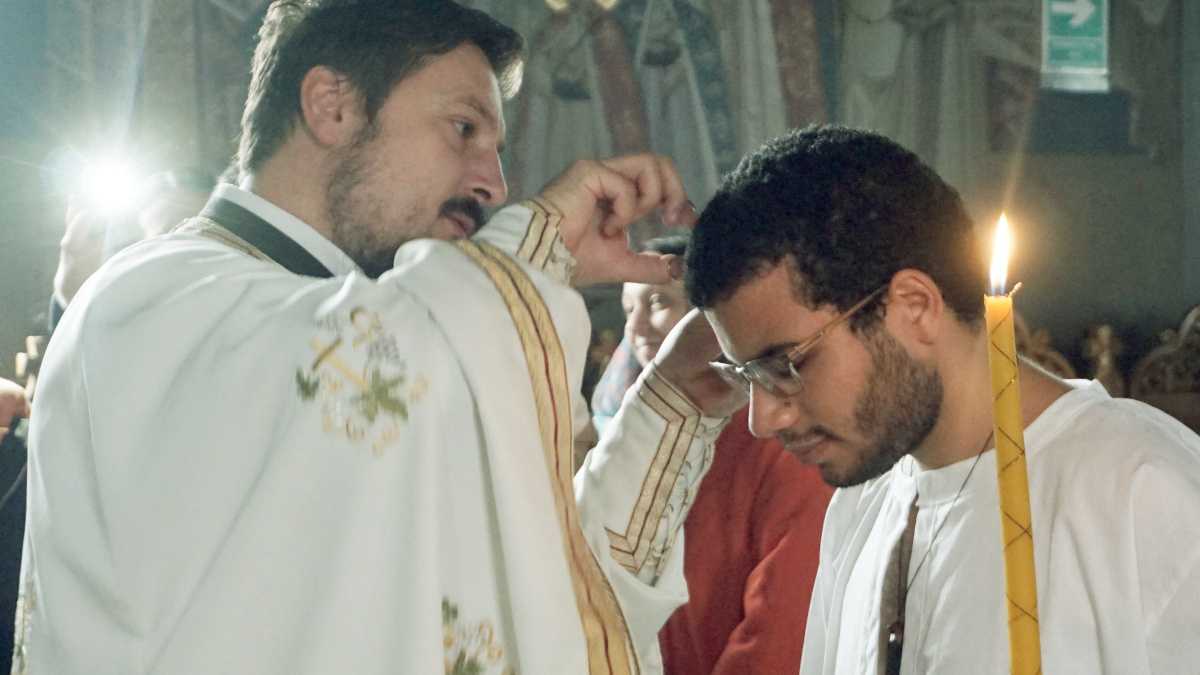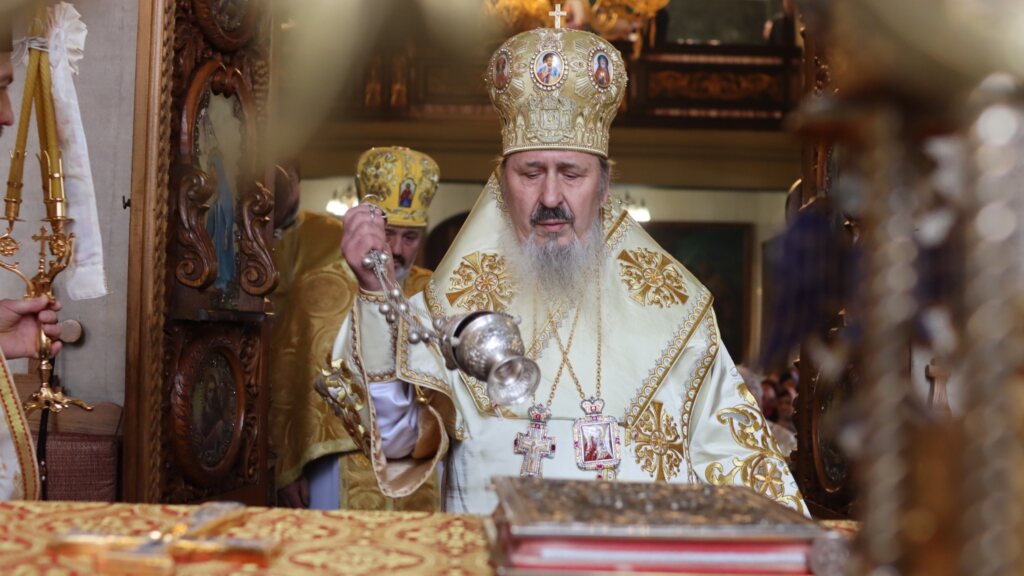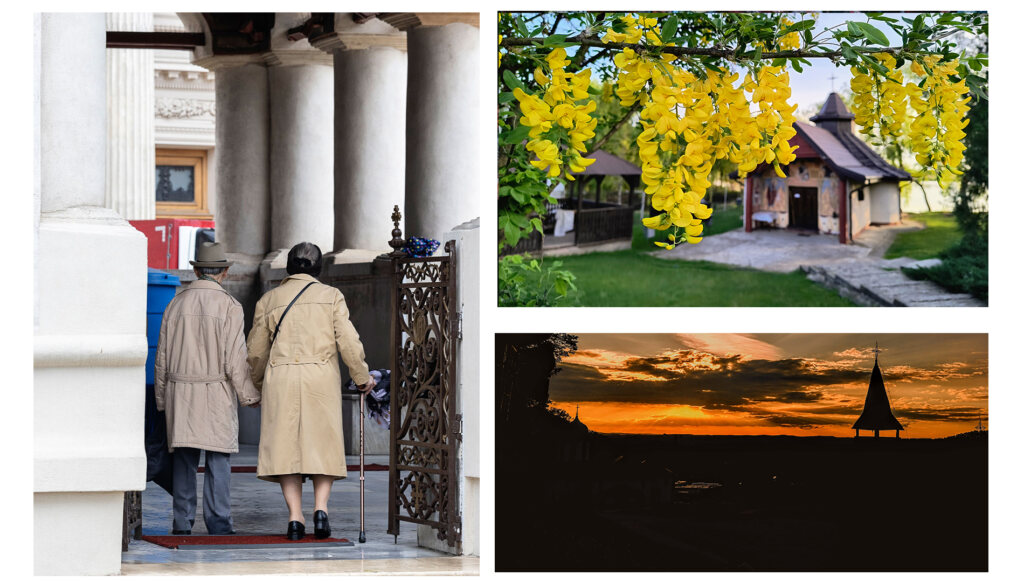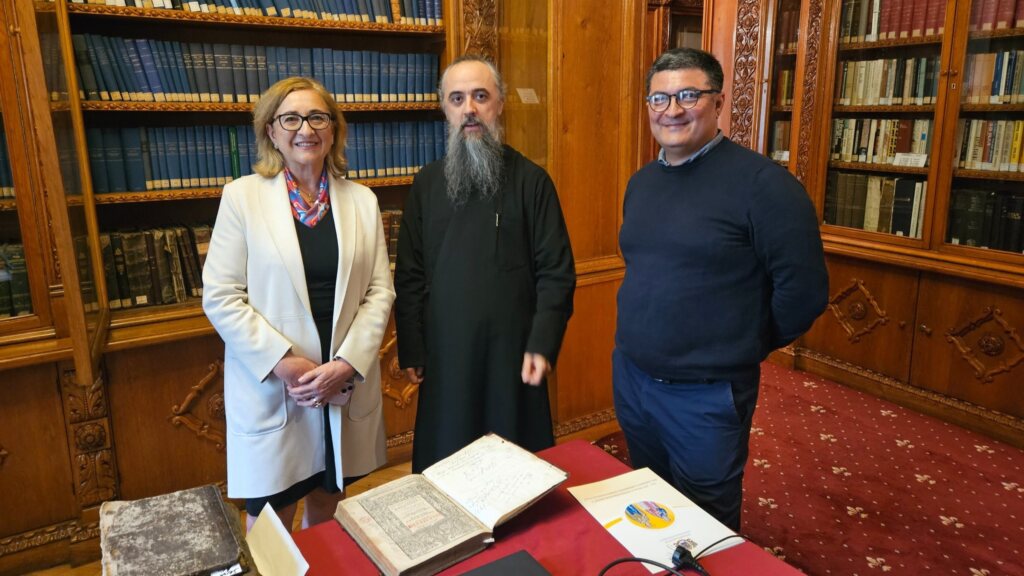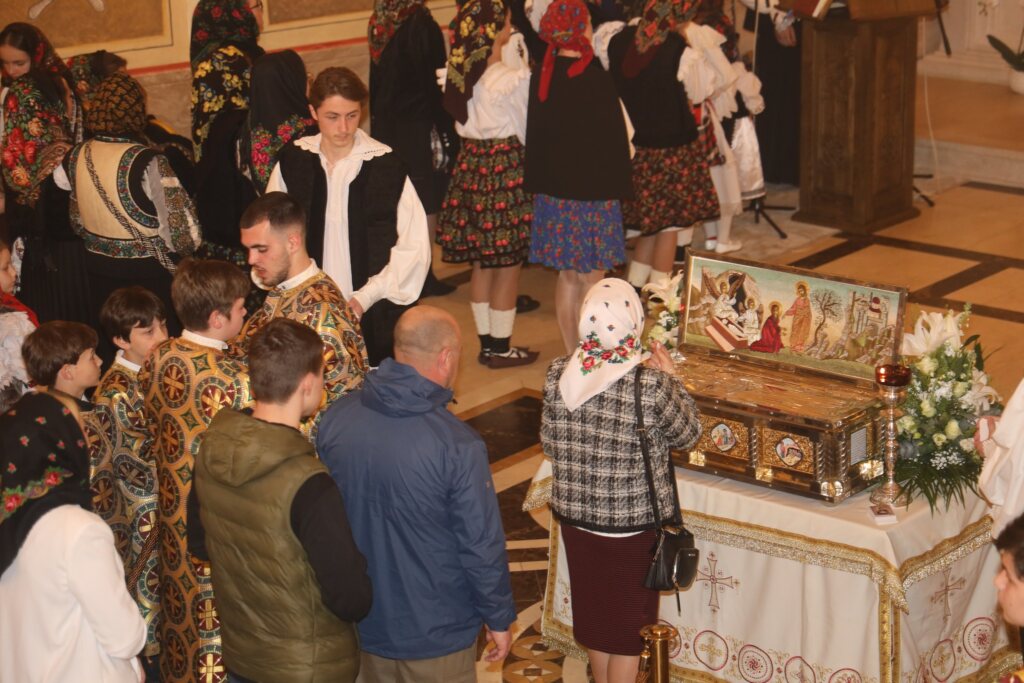Pedro Faidiga Passos, a Brazilian who converted to Orthodoxy and settled in Romania, says that God “fished him” through his Romanian wife and thus revealed to him “the full beauty of the Christian faith.” He said he finds a lot of peace in Romania.
Pedro Faidiga Passos is 27 years old and was born in São José do Rio Preto, located 450 km northwest of Sao Paulo, the largest city in Brazil. An Erasmus program brought him to the heart of Europe, to Strasbourg, where he studied music.
There he met Raluca, a young woman from Bacău of the same age as him. They met at a semiology class they both attended.
The first thing that struck him was her shyness. But maybe that’s what won him over. After a short separation, the two met again at a master’s degree in Portugal and decided not to separate.

They had their civil wedding at Pedro’s home in August 2019 and their religious wedding in Romania, where they settled. Before the wedding, Pedro received the Orthodox baptism.
“God fished for me through my wife”
Pedro’s father is a Presbyterian pastor, so Pedro was part of a united and active Christian community until he arrived in Romania.
“In Brazil too I really liked going to church,” he says. “I went to the liturgy in the morning, where there were many old people who had known me since I fit in a shoebox and had prayed for me before I was born.”
This was also one of the reasons why the young couple had a civil wedding in Brazil: many members of the congregation attended the ceremony.
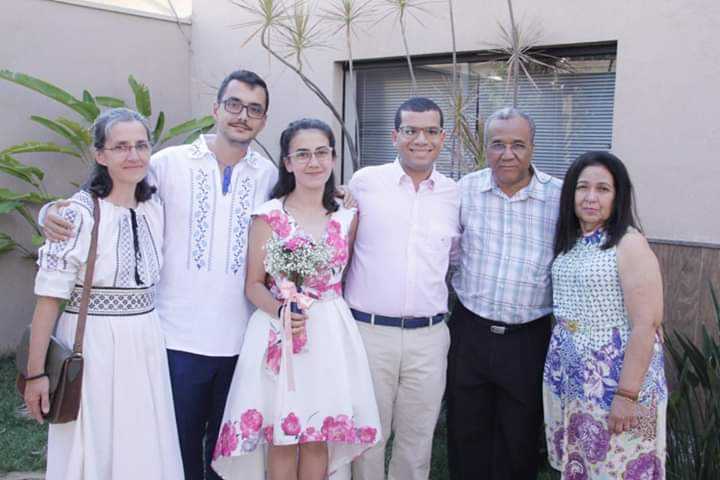
“There are several factors that helped me convert. I always say that God fished me through Raluca. If I hadn’t known her, I don’t know if I’d gotten to know Orthodoxy better. There are few Orthodox churches in Brazil,” Pedro Faidiga Passos says.
“If I had not met a faithful Orthodox person with a simple, pure faith, I do not know if I would have become Orthodox, as I am today,” he added.
Of course, his baptism was preceded by much analysis and many questions. But God worked in His way, the Brazilian says.
“I have found the full beauty of the Christian faith”
“One day, I was on my way to college. It was a gorgeous road, with many trees, birds were singing. I was thinking, “You think the Body and Blood of the Saviour in Orthodoxy is a lie. But if it’s true, no matter what you believe or don’t believe? Suppose it were true. Does it make sense or not? Can we heal with this? Yes”.”
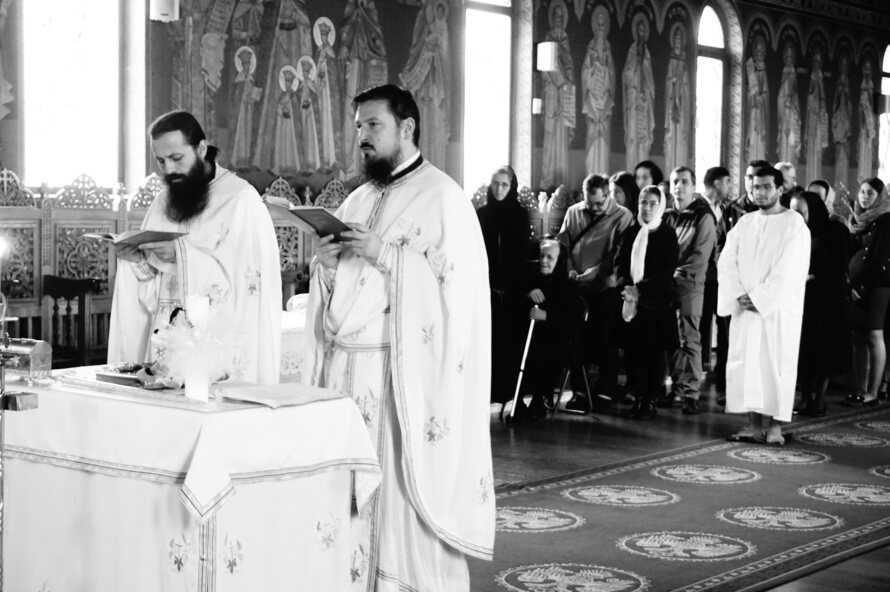
This possibility of healing by partaking of the Sacraments of the Church attracted him the most.
“Without healing, what use is Orthodoxy to us? We seek to uproot our passions, our bad thoughts; we try to love God and others more. Without these efforts, there is no point in being Orthodox. There is no point in religion, in fact,” he says. “Through the Body and Blood of Christ God, the Church gives us the pill of eternal healing.”
And he was convinced by what he calls the “beauty of Orthodoxy.” “My conversion to Orthodoxy did not contradict but fulfilled everything I previously believed. I found the full beauty of the Christian faith,” Pedro noted.
“There are many hymns sung in my Protestant church, the true meaning of which I have found in Orthodoxy. For example, my grandparents liked a hymn made from the verses of Psalm 50 (51). We sang it here in Brazil with a certain meaning. But, as an Orthodox, having Holy Communion, the whole meaning changes! I understand the full meaning of the words “I shall be whiter than snow.”

Pedro’s family received the news of his conversion as any loving family would.
“It was a little sad for them, but God is working. I hope it will help them to know the faith better. Sometimes my father says Orthodox things in his sermons without knowing it. And I’m surprised to see him sometimes speak so Orthodox-like. Surely God in time will reveal the mystery to them too,” Pedro Faidiga Passos said.
Eternity was born in the Romanian village
Pedro and his wife, Raluca, visited Cluj, Oradea, Craiova, Oașa, Brașov and Bukovina together, which the Brazilian man especially liked.
“At Nicula Monastery, I saw the love of the Mother of God poured out through the monks there and the people in that area,” he says. “Today, when we don’t even walk to church in our cities, I imagined how people gather at the patronal feast every year, coming on foot, even from Oradea or Baia Mare. It is as if they feel the joy of being together with the Mother of God.”
“The Mother of God sees this love and gives us even more love and joy to do these feats,” he says.
Another special place for Pedro was the Pain Memorial in Sighetul Marmației. If he were to describe it in one word, he would hesitate between shocking and powerful, balancing more towards the latter. “What would we have done in their place?” He asked himself. “Would we have the power not to renounce Christ?”

He also recently visited Maramureș. “The feeling was of eternity. It’s like the time there doesn’t matter anymore. It is as if God has given us a piece of everlasting earth.”
Maramureș, with its fairytale houses, with carts pulled by animals, with people working in the yard and the field, seemed to him “a place where time wanted to stop. The impression is of eternity, not of old «retrograde» times. It is a tranquil place,” he explains.
Romania has the gift of bringing peace
“In general, Romania has this gift of peace,” Pedro Faidiga Passos pointed out. “I tell everyone that Romania seems to me a tranquil place compared to Brazil.”
In Bacău, in my wife’s home city, you can go anywhere on foot. There are few cars on the smaller streets. Even in more crowded cities, you can find a quiet church or even a monastery in the neighbourhoods.
“I think that the Church also helps with this: to have a calmer spirit over all of Romania. There is the same spirit in this country as in the Orthodox churches: even at the wedding, when people dance the oro, it is also a rhythmic and calm dance, with a quiet beauty and joy.”
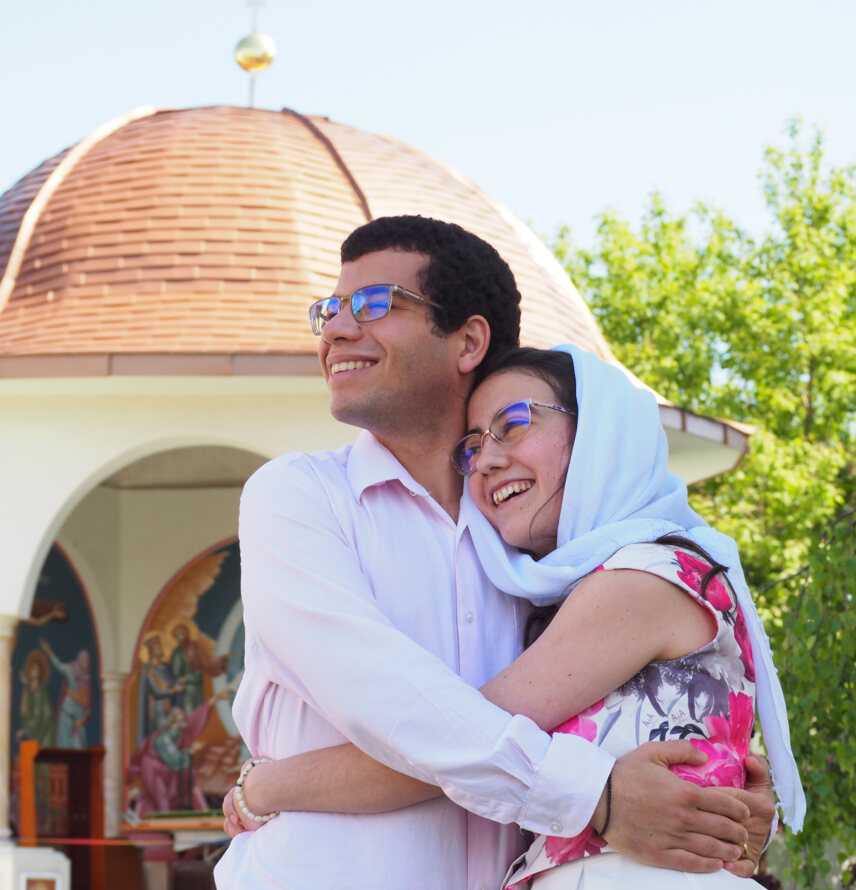
“The church hymns transmit the same state: “Blessed are you, Lord, teach us your statutes!” It is sung at the Commemoration of the Dead. So whether you go to the funeral or attend the joy of a wedding, it’s the same spirit of peace,” Pedro says.
How Romanians perceive themselves
This sometimes contrasts with some attitudes preserved in society after communism. For example, when I go to the police for some documents or to the store, I expect a “Hello, how are you?” but am shocked when I hear dryly: “Say!” I don’t even know how to react,” he says.
“But Romania has a special beauty, and I am very sorry when Romanians say that there is no civilization here and that they should flee this country.”
“I hear this quite often, and it saddens me. Once, someone from Greece and I were talking to two other Romanians. We said how beautiful it is in Romania, while the Romanians spoke only badly about their country”.
Let’s not lose our peace
However, Pedro is considering staying in Romania. He believes that Romanians can give the world a lot of faith and peace.
“In this difficult period of history, Romanians need to be with Christ. They need calmness, not to think all day about vaccines and the Antichrist. It’s good to think a little, but don’t dwell on these things. Jesus Christ said we would be persecuted, but let us keep our eyes on Him without losing our peace.”
The first Lent spent as an Orthodox was for Pedro amid a pandemic and lockdown. It was a big test for him.
“If you are not present at church for services, it is not the same thing: to be with everyone else at the church for Easter, to receive Communion and all to sing Christ is risen,” Pedro says.
Photos: Personal archive of Pedro Faidiga Passos
Follow us on Twitter: @BasilicaNews
